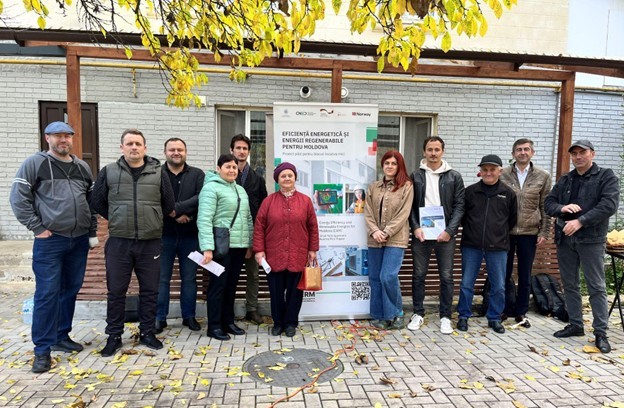
Lower energy bills for ten residential buildings to be energy renovated
A number of 10 residential buildings, totaling over 120 apartments will benefit from renovation works to improve energy efficiency and reduce energy bills. The project's technical documentation will be developed free of charge as part of a pilot project funded by Norway, part of the Energy Efficiency and Renewable Energy for Moldova Program (E4M).
The beneficiary buildings are located in Chisinau, Bălți, Edineț, Hâncești, Cahul and Ceadîr-Lunga. They were built before 2005. Technical experts will further evaluate the 10 buildings, and architects and engineers will prepare the necessary technical documentation for submitting financing applications to the Residential Sector Energy Efficiency Fund (FEERM) for the next stage of construction works.
Proposed measures include thermal insulation of walls and roofs, replacing old and inefficient windows with new energy-efficient ones, and installing photovoltaic panels on roofs to produce renewable energy. Implementing these works will significantly reduce energy losses, lower residents' bills, and simultaneously increase property values.
The blocks were selected from a total of 15 properties that received free energy audits. As a result of these audits, measures with the highest potential for energy savings and cost efficiency for each building were identified. The costs for conducting the audits and developing the technical projects are fully covered by the pilot project Energy Efficiency and Renewable Energy for Moldova (E4M).
'Through this pilot project, we test a practical model of energy renovation for small residential blocks that can serve as an example for future investment programs. Our goal is to identify technical solutions and financial mechanisms adapted to buildings with a small number of apartments, so they can access renovation funds,' said Ion Muntean, director of the National Center for Sustainable Energy (CNED).
The 10 buildings selected for the technical documentation stage were chosen based on several criteria, including replication potential, structural integrity, legal compliance, and the level of involvement of homeowners' associations. The selection process also considered the buildings' potential to achieve maximum energy savings following the implementation of proposed measures. The technical documentation is a crucial step for obtaining funding through FEERM, necessary for executing energy renovation works.
Christian Borchard, implementation manager of the E4M component funded by Norway within GIZ, stated that the experiences gained from these pilot projects are extremely important to be scaled nationally in the coming years.
The FEERM program is developed by the Government of the Republic of Moldova, with financial support from the European Union, implemented by the National Center for Sustainable Energy and the Ministry of Energy, with the support of the Energy Efficiency and Renewable Energy for Moldova project (E4M), implemented by GIZ together with the Government of the Republic of Moldova, funded by the German Government and co-financed by the European Union, Norway and Denmark.
National Energy Regulatory Agency's leadership, U.S. Embassy's representatives analyze identifying alternative sources, routes for supplying Moldova with oil products
Weekly payments collected via Single Euro Payments Area in Moldova increase by 186 per cent
Moldovan electricity market operator starts registration of participants in organized electricity markets
European Commissioner for Financial Services and Savings and Investments Union to come to Chisinau
Scenarios of reuse of wastewater for irrigation to be developed in Causeni, Cantemir, Cahul settlements of Moldova
Private investments recorded six consecutive quarters of growth
Partnership to support farmers: three institutions synchronize funding programs
Moldova introduces smart transport: digital tickets and fast payments via apps
Energy minister in Bucharest: Moldova enters winter with over 90% of gas needs secured
New deputy PM for reintegration introduced to Reintegration Policies Bureau's team
New ministers of Moldova's government introduced to ministries' teams
New subscription round for government securities in Moldova; investment options for citizens
Chisinau Airport initiates process of expanding passenger terminal
Governor of National Bank of Moldova in Bucharest says European path choice of future for new generations
New step to establishment of International Stock Exchange of Moldova; shareholders' agreement signed
Government announces registration for energy compensation in cold season
Protection of environmental defenders – priority discussed at European level, with Moldova's participation
VIDEO // European Commission to unveil Moldova's progress in EU accession process on November 4
Moldovan president to discuss advancement of Moldova's EU accession process in Brussels
PHOTO GALLERY // Scoreni Barrel Festival – holiday of local traditions and culture
New Minister of Finance introduced to team
Eugen Osmochescu introduced to Ministry of Economic Development and Digitalization team
Moldova returns to Eurovision Song Contest 2026 with new national selection format
Over 100 civil servants trained in applying regulatory impact analysis methodology for draft legislation
Lower energy bills for ten residential buildings to be energy renovated

